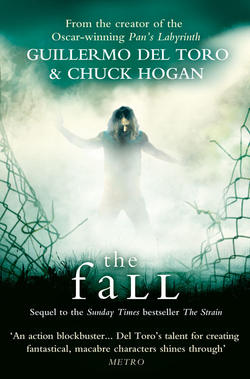Читать книгу The Fall - Чак Хоган, Гильермо дель Торо, Chuck Hogan - Страница 12
Fairfield County, Connecticut
ОглавлениеTHE LOW-SLUNG BUILDING was one of a dozen at the end of the crumbling road, an office park that had been foundering even before the recession hit. It retained the sign of the previous tenant, R. L. Industries, a former armored car dispatcher and garage, and accordingly remained surrounded by a sturdy twelve-foot chain-link fence. Access was by key card through an electronic gate.
The garage half of the interior held the doctor’s cream-colored Jaguar and a fleet of black vehicles befitting a dignitary’s motorcade. The office half had been refitted into a small, private surgery dedicated to servicing one patient.
Eldritch Palmer lay in the recovery room, waking to the usual postoperative discomfort. He roused himself slowly but surely, having made this dark passage to returning consciousness many times before. His surgical team knew well the appropriate mix of sedatives and anesthesia. They never put him under deeply anymore. At his advanced age, it was too risky. And for Palmer, the less anesthesia used the faster he recovered.
He remained connected to machines testing the efficiency of his new liver. The donor had been a teenage Salvadorian runaway, tested to be disease-, drug-, and alcohol-free. A healthy, young, pinkish-brown organ, roughly triangular in shape, similar to an American football in size. Fresh off a jet plane, fewer than fourteen hours since harvesting, this allograft was, by Palmer’s own count, his seventh liver. His body went through them the way coffee machines go through filters.
The liver, both the largest internal organ and the largest single gland in the human body, has many vital functions, including metabolism, glycogen storage, plasma synthesis, hormone production, and detoxification. Currently, there was no medical way to compensate for its absence in the body—which was most unfortunate for the reluctant Salvadorian donor.
Mr. Fitzwilliam, Palmer’s nurse, bodyguard, and constant companion, stood in the corner, ever-vigilant in the manner of most ex-Marines. The surgeon entered, still wearing his mask, pulling on a fresh pair of gloves. The doctor was fastidious, ambitious, and, even by most surgeons’ standards, incredibly wealthy.
He drew back the sheet. The newly stitched incision was a reopening of an older transplantation scar. Outwardly, Palmer’s chest was a lumpy tableau of disfiguring scars. His interior torso was a hardened basket of failing organs. That was what the surgeon told him: “I am afraid your body cannot sustain any more tissue or organ allografts, Mr. Palmer. This is the end.”
Palmer smiled. His body was a hive of other people’s organs, and in that way he was not dissimilar from the Master, who was the embodiment of a hive of undead souls.
“Thank you, doctor. I understand.” Palmer’s voice was still raw from the breathing tube. “In fact, I suggest that you strike this surgery altogether. I know you are concerned about the AMA finding out about our techniques of organ harvesting, and I hereby release you from obligation. The fee you collect for this procedure will be your last. I will require no further medical intervention—not ever.”
The surgeon’s eyes remained uncertain. Eldritch Palmer, a sick man for nearly all his life, possessed an uncanny will to live: a fierce and unnatural survival instinct the likes of which the surgeon had never before encountered. Was he finally succumbing to his ultimate fate?
No matter. The surgeon was relieved, and grateful. His retirement had been planned for some time now, and everything was arranged. It was a blessing to be free of all obligations at such a tumultuous time as this. He only hoped the flights to Honduras were still in operation. And burning down this building would draw no inquiries in the wake of so much civil unrest.
All this the doctor swallowed with a polite smile. He withdrew under Mr. Fitzwilliam’s steely gaze.
Palmer rested his eyes. He let his mind go back to the Master’s solar exposure, perpetrated by that old fool, Setrakian. Palmer assessed this development in the only terms he understood: What did it mean for him?
It only sped up the timeline, which, in turn, expedited his imminent deliverance.
At long last, his day was nearly at hand.
Setrakian. Did defeat indeed taste bitter? Or was it more akin to ashes on the tongue?
Palmer had never known defeat—would never know defeat. And how many can say that?
Like a stone in the middle of a swift river, stood Setrakian. Foolishly and proudly believing he was disrupting the flow—when, in fact, the river was predictably running full-speed right around him.
The futility of humans. It all starts out with such promise, doesn’t it? And yet all ends so predictably.
His thoughts turned to The Palmer Foundation. It was indeed expected among the super-rich that each of the world’s wealthiest endow a charitable organization in his own name. This, his one and only philanthropic foundation, had used its ample resources to transport and treat two full busloads of children afflicted by the recent occultation of the Earth. Children struck blind during that rare celestial event—either as a result of peeking at the eclipsed sun without proper optical protection, or else due to an unfortunate defect in the lenses of a batch of child-size safety glasses. The faulty glasses had been traced back to a plant in China, the trail running cold at an empty lot in Taipei …
No expense was to be spared in the rehabilitation and re-education of these poor souls, his foundation pledged. And indeed, Palmer meant it.
The Master had demanded it so.
